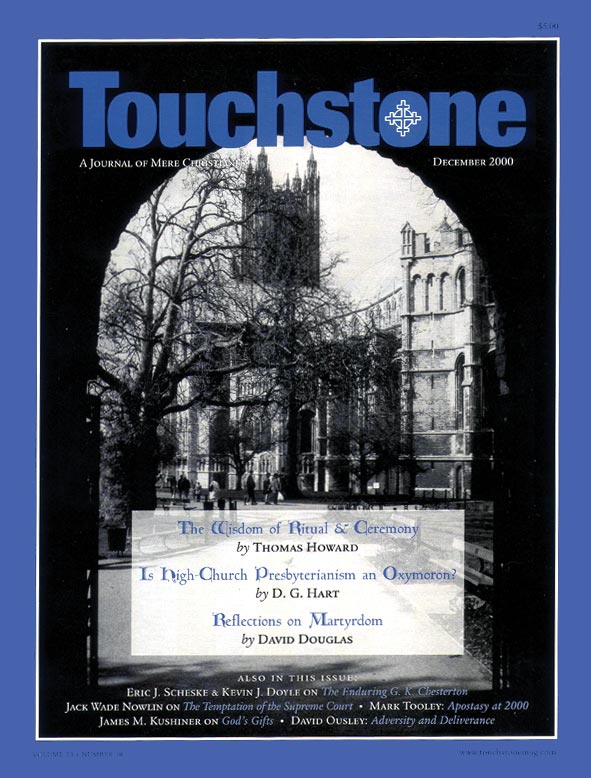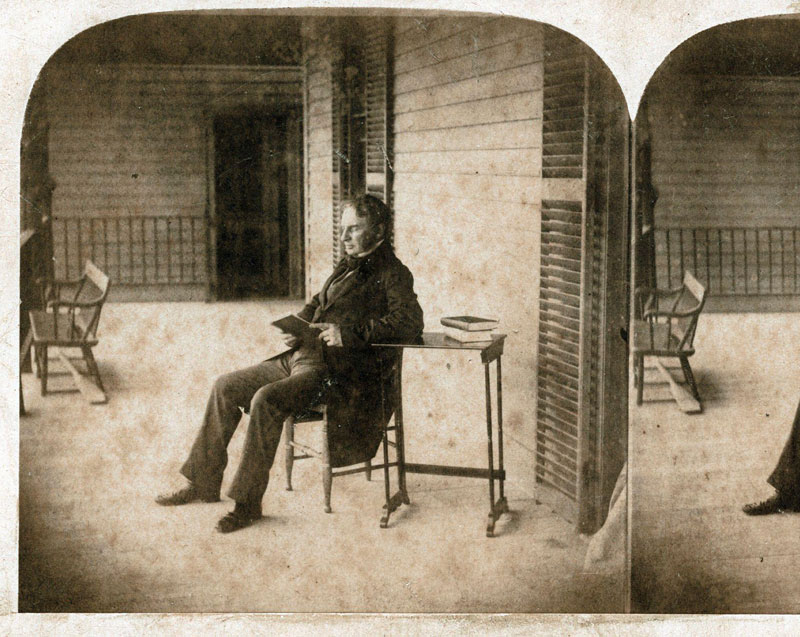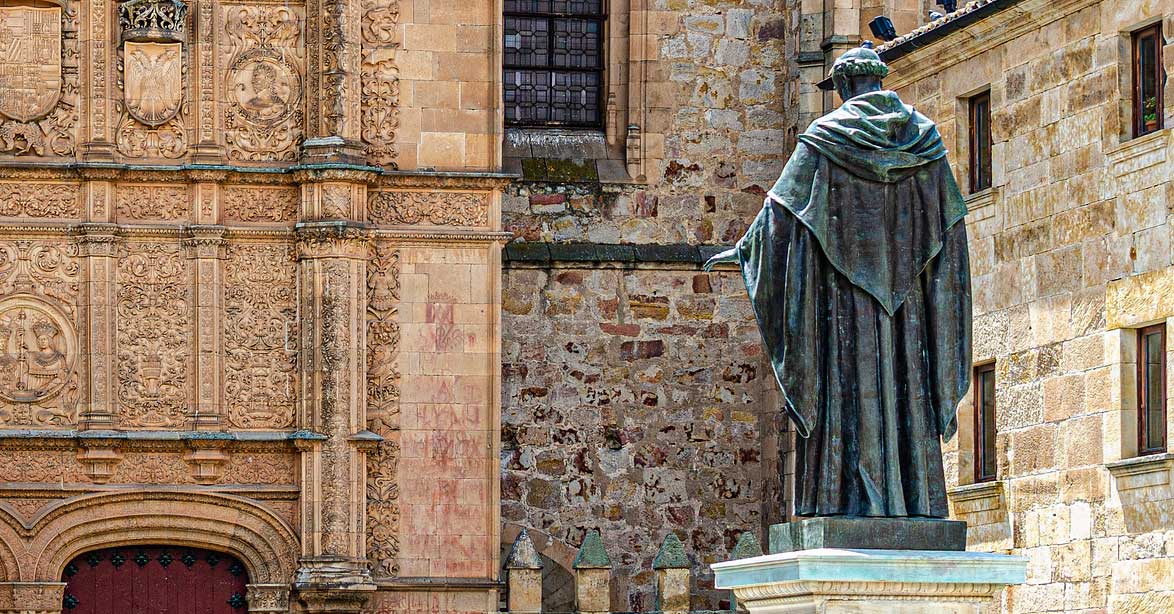The Gift of Man & Christ
This year Baylor University, Concordia University, and Yale University hosted conferences on intelligent design, a topic of interest to popular audiences as well as scientists. The question being debated—with many permutations and side issues inevitably involved—is whether the nature and structure of the material universe and the life discernible therein to the empirical eye of science show evidence of being designed by an intelligent agent or arose simply by chance.
I attended all the conferences and listened to the lectures and debates on the pros and the cons of Darwinism and intelligent design. After days of debate, after looking at details of micro- and macro-evolution, DNA structure, genetic coding, probability statistics, cosmological constants, multiple universe schemes, and a little bit of quantum physics thrown in, the details can overwhelm the non-scientist (Touchstone editors included).
Still, the best presenters worked to make the information, as well as their conclusions, accessible to laymen. Opponents and proponents of Darwinism alike have written books aimed at a popular audience. And publishers understand the popularity of the topic. Of all the subjects Touchstone has dealt with, none has drawn as much attention as intelligent design (nor sold as many copies). There seems to be an insatiable appetite for the controversy. Why is this?
I believe it is because Christians instinctively know that much more is at stake here than the fate of a particular late nineteenth-century theory about the origins of life. It is easy to lose sight of this when one only looks at the science. But when the din of the dispute about evolution has died down and the temptation to refute certain scientific arguments has lost its immediacy and one simply and quietly can reflect on his own existence, as I recently did after several days of science, a simple question emerges: Is life a gift? More to the point, is my life a gift?
When I ask this question of myself, a major change of mental scenery takes place; detailed images of physical objects and their internal operations fade like phantoms in the clear light of a question that honest men know they cannot simply shrug off. Sometimes when I pose this question to Christians who have just come fresh from the fields of scientific debate, it stops them dead in their tracks. It is a fundamental question, the answer to which separates the religious believer from the unbeliever.
From this answer arises one’s basic attitude toward life. To answer “yes” to this question is to become oriented toward a great mystery; for if life is a gift, there is a Giver. Still, one may then either ignore the gift and take life for granted or be thankful for it.
The question of whether life (or our cosmos for that matter) arose by the will of God or simply by chance is not merely a philosophical question. It is also a cultural question. For a culture that views life as a gift will be very different from one that views life otherwise. The fundamental divide is obvious in the widening gap between the culture of life and the culture of death. The former embraces protection of children in the womb and deeply values the procreative nature of the family as reflected in the marriage bond of the man and woman—it is a culture that loves children and welcomes them as gifts. Since children are gifts from God, they are not to be treated as mere conglomerations of biological materials that happened to come together.
This relates to another question that is at stake in the debate between materialists and believers. If man is a great cosmic accident, then just who or what is the particular man who is called Jesus Christ? A human being who arose from the material of the universe through random mutations and natural selection—like the rest of us? Just by chance?
Or, on the other hand, did Christ come in the fullness of time, and was his mother Mary chosen by God to bear him? Is he the incarnate Son of God or an accident?
The question of the nature of Man is ultimately a christological question: “What think ye of the Christ? Whose son is he?” For the Christian, the resounding answer is, “Jesus is Lord.” He is the Son of God, the Savior.
Just as the question about life as a gift separates the religious believer from the secular materialist, so the question about who Jesus Christ is separates the Christian from not only other religious believers but also from many who claim to be Christians today.
For the name of Jesus Christ is bandied about in churches by those who no longer mean what the Church has always meant. It has simply become a phrase with connotations that vary depending on one’s view of Christ: the great pacifist, the liberator, the messiah, the moral teacher, the revolutionary, the mystic, my best pal, or what have you.
But there is no room in the churches for compromise here. There can be no hesitation in confessing along with St. Peter, “Thou art the Christ, the Son of the living God!” There is a great gulf fixed between those who believe and confess that the eternal Word of God “became flesh and dwelt among us” and that “we have seen his glory, as of the only-begotten Son, in the bosom of the Father,” and those who deny this.
We confess that Jesus Christ is the Son of God, who for our sake and for our salvation was made man, conceived of the Holy Spirit and the Virgin Mary. This is the Gift of God that we celebrate in the Christmas services of the churches and confess in the Creed. This is non-negotiable. Theologians and clergy employed by the churches have a responsibility to uncompromisingly proclaim this truth. Those who do not are unfaithful and need to be removed from their teaching offices.
That God became man reveals to us what man is in the cosmos. He is not lost in the cosmos, an insignificant outcropping of sentient biological matter on a tiny planet in an accidental universe. Each life is a gift, spoiled by sin but rescued from damnation by the Gift of God’s Son, our Lord Jesus Christ. To suggest that each life that Jesus came to save has no ultimate meaning is to suggest that the blood he shed for our redemption is of no consequence. This is sacrilegious.
There is no room for confusion about the sacredness and value of all human life. Innocent human life may not be taken. Christians from the earliest times have not countenanced abortion. This is not a matter for discussion, for Christians do not kill babies or support those who do. It is unthinkable.
While science helpfully may show us some of the inner workings of matter and human beings, Christians believe both that man’s life is a gift from God and that Christ is God’s gift of himself to man.
And we need no longer speculate or wonder about the nature of the Intelligent Designer. For we have met him and seen him. He not only made man, but also became man, and we have seen his face, full of grace and truth. And when the angels of God knew that his sacred face had appeared as the defenseless and innocent Child of Bethlehem, they sang, “Glory to God in the Highest!” And so must we, ever and always, if we are to know our place in the cosmos.
—James M. Kushiner, for the editors
James M. Kushiner is the Director of Publications for The Fellowship of St. James and the former Executive Editor of Touchstone.
subscription options
Order
Print/Online Subscription

Get six issues (one year) of Touchstone PLUS full online access including pdf downloads for only $39.95. That's only $3.34 per month!
Order
Online Only
Subscription

Get a one-year full-access subscription to the Touchstone online archives for only $19.95. That's only $1.66 per month!
bulk subscriptions
Order Touchstone subscriptions in bulk and save $10 per sub! Each subscription includes 6 issues of Touchstone plus full online access to touchstonemag.com—including archives, videos, and pdf downloads of recent issues for only $29.95 each! Great for churches or study groups.
Transactions will be processed on a secure server.
more from the online archives
calling all readers
Please Donate
"There are magazines worth reading but few worth saving . . . Touchstone is just such a magazine."
—Alice von Hildebrand
"Here we do not concede one square millimeter of territory to falsehood, folly, contemporary sentimentality, or fashion. We speak the truth, and let God be our judge. . . . Touchstone is the one committedly Christian conservative journal."
—Anthony Esolen, Touchstone senior editor









